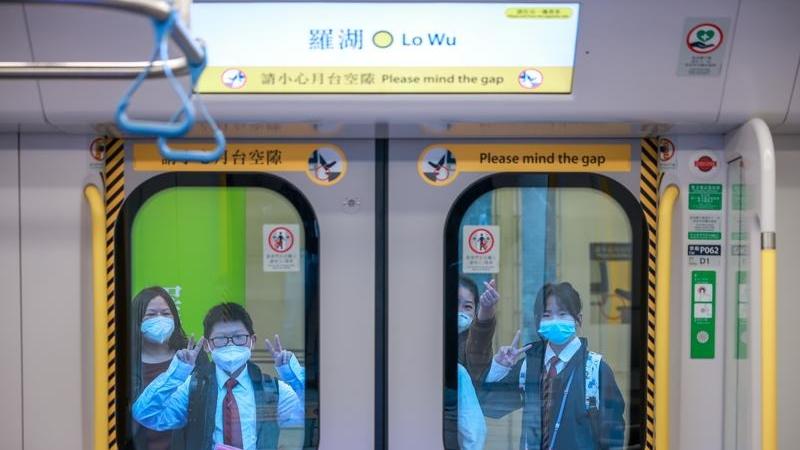 Cross-boundary students and their parents gesture as they wait for the train at Lo Wu station in Hong Kong, on Feb 6, 2023. (ANDY CHONG / CHINA DAILY)
Cross-boundary students and their parents gesture as they wait for the train at Lo Wu station in Hong Kong, on Feb 6, 2023. (ANDY CHONG / CHINA DAILY)
Hong Kong lawmakers, organization leaders and experts familiar with cross-border affairs said on Thursday that the existing health-declaration procedure for travel between Hong Kong and the Chinese mainland needs to be improved if not abandoned completely, as it is cumbersome and impedes the immigration clearance process.
Currently, cross-boundary passengers need to complete an electronic heath declaration form and generate a “black QR code” on their smartphones every time they enter or leave the mainland.
Although staff members have been deployed over the past few months to assist passengers, the declaration process has repeatedly caused long lines at border checkpoints during peak hours
As the number of people traveling between the two places has continued to climb since Jan 8, when quarantine-free cross-border travel resumed, many residents and civic leaders believe that the declaration mechanism is time-consuming and not user-friendly for some travelers, including the elderly, who are not good at using cellphones.
READ MORE: HK NPC deputies sign petition to cancel health declaration code
Although staff members have been deployed over the past few months to assist passengers, the declaration process has repeatedly caused long lines at border checkpoints during peak hours.
Hong Kong lawmaker Edward Leung Hei told China Daily on Thursday that the black QR code played an important role during the COVID-19 pandemic, but as both the Hong Kong and mainland societies have returned to normal, it is time for the black QR code to wrap up its “historic mission”, he said. There is a need to discuss its cancellation to facilitate cross-boundary travels, he added.
Leung said that many neighboring regions, such as Japan, have already lifted their health declaration requirements for cross-boundary travel, and this has received positive feedback from passengers. Such arrangements do not trigger significant resurgence of the pandemic, too, Leung said, adding that he believes the cancellation of the “black QR code” is appropriate at this time.
Timothy Chui Ting-pong and Fanny Yeung Shuk-fan, two representatives of the Hong Kong travel industry, both agree that the “black QR code” has imposed a lot of inconvenience on travelers, especially to the elderly.
Chui, executive director of the Hong Kong Tourism Association, told China Daily that elderly travelers are usually unfamiliar with smartphones, not to mention phone apps. As a result, these groups may give up traveling, he said.
Yeung, executive director of the Travel Industry Council of Hong Kong, said the current health declaration process has cost travelers significantly more time as everyone must line up to get their black QR code scanned at checkpoints. She said she believes that the cancellation of the black QR code can greatly improve passengers’ travel experiences.
The unstable Wi-Fi signal at checkpoints also makes it difficult for travelers to fill in information and generate the black QR codes quickly
Wen Yajing, deputy director of the Institute of Hong Kong, Macau and Regional Development, China Development Institute, said the black QR code is unsuitable at this stage as most of the QR codes designed for anti-pandemic work on the mainland have been canceled.
The black QR code now looks odd as almost all of the anti-pandemic restrictions were lifted in both Hong Kong and the mainland, Wen added.
Wen told China Daily that she frequently takes high-speed trains between Shenzhen and Hong Kong for meetings as bullet trains can take her to destinations in a very short time. However, she now has discovered that she needs to allocate at least 45 minutes of extra time to complete the health declaration process and other border clearance procedures, which is extremely inconvenient and not conducive to the integration of the Guangdong-Hong Kong-Macao Greater Bay Area.
READ MORE: HK will benefit from bigger role in nation’s opening up
Fung Wing-cheong, deputy director of the Hong Kong Federation of Trade Unions’ Shenzhen consulting service center, told China Daily that the black QR code mode is inconvenient, especially to the elderly and those with physical disabilities or carrying heavy luggage. He suggests canceling — or at least simplifying — the procedure.
Fung said that the limited number of employees at checkpoints makes it difficult to provide timely help given that the number of passenger is so large. The unstable Wi-Fi signal at checkpoints also makes it difficult for travelers to fill in information and generate the black QR codes quickly.
Foreigners are required to complete the declaration at manual counters, which also takes extra time, he added.


